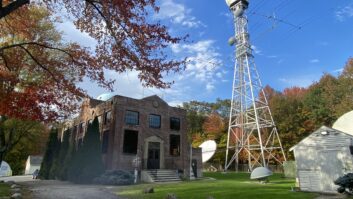National Public Radio is floating a new idea on how the FCC’s rethinking the future of Franken FMs could ultimately create a batch of new noncommercial educational (NCE) radio stations across the United States.
The FCC is pondering a final resolution to the Franken FM issue and has opened a notice of proposed rulemaking to gather industry comment. The so-called FM6 stations are low-power digital television stations whose analog audio can be received on radios at 87.75 MHz.
NPR has submitted an idea that piggybacks on whatever conclusion the FCC adopts in its FM6 proceeding. NPR proposes to repurpose channel 6 spectrum (82-88 MHz) for FM services in locations where the channels are not being used to provide “actual television programming,” by channel 6 LPTV and full-power stations, according to the FCC.
NPR believes that the continued use of digital TV channel 6 to provide analog FM radio service is contrary to the current statute and poor public policy. FM6 stations currently operate with STA from the FCC allowing them to utilize a hybrid configuration of ATSC 3.0 digital to operate a separate analog FM radio transmitter on 87.7 MHz in an analog format as an ancillary service. Radio operators have historically been opposed to the idea of officially sanctioning the dual operations of FM6 stations and likely would be of “second-gen” Frankens.
However, NPR still contends TV channel 6 spectrum is a valuable resource the commission could use to expand opportunities for existing and prospective radio broadcasters whose demand for spectrum cannot be satisfied in the crowded FM radio band.
“Specifically, NPR maintains that the spectrum occupied by a single TV channel 6 station could potentially accommodate up to 30 new FM stations, exponentially increasing the variety of programming available for a diverse audience,” the FCC says in its new notice of proposed rulemaking deciding the fate of FM6 stations.
The FCC acknowledges in its NPRM that, in theory, 30 available 200 kHz FM radio channels are available in the band that comprises TV channel 6, however “practically speaking, the number of channels for use by new FM radio stations in any one area would be significantly less,” according to the FCC.
[Related: “FCC Will Consider Franken FMs in June“]
NPR believes repurposing the spectrum would be a “far better use of a scarce resource” than the analog audio operations (FM6) that exist in some locations, the FCC says.
“NPR also argues that it would increase the opportunities for diverse providers to provide local public interest programming for unserved and underserved audiences, especially in the rural parts of the country,” according to the FCC document.
Perhaps most importantly, the FCC seeks comment from industry stakeholders on whether radio listeners will be able to receive new FM radio stations on the frequencies NPR is suggesting. The commission notes that commercially available FM radio receivers currently only receive the upper-most portion of the 82-88 MHz band (87.7 or 87.9 MHz).
“Today’s FM radio receivers cannot tune down to the rest of the (proposed radio) spectrum − 82.1-87.5 MHz. We invite comment on how this technical roadblock should influence our consideration of this issue,” the FCC contends.
The FCC also is asking, if it were to allow for radio broadcasts to operate on 82-88 MHz, should such stations be limited to noncommercial educational stations or should commercial FM stations also be allowed to operate on the new frequencies.
Finally, the FCC addresses the costs of “precluding existing TV stations from using the currently unused locations where TV channel 6 is viable and foreclosing new TV stations on channel 6.”
The commission concludes its questions about the NPR proposal by addressing potential interference concerns: “We seek comment on the potential for interference if we permitted new FM radio services as contemplated by NPR. Would such services pose the threat of interference with existing services in this band? If so, how should these concerns be mitigated to extent we pursue such an expansion?”
The discussion of this proposal is but one of the many aspects of the FM6 debate about which the commission is currently taking comments as described in our earlier coverage this week. The deadlines to comment in MB Docket No. 03-185 have not yet been published.







